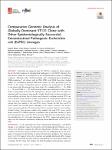Comparative Genomic Analysis of Globally Dominant ST131 Clone with Other Epidemiologically Successful Extraintestinal Pathogenic Escherichia coli (ExPEC) Lineages
Shaik, Sabiha
Ranjan, Amit
Tiwari, Sumeet K.
Hussain, Arif
Nandanwar, Nishant
Kumar, Narender
Jadhav, Savita
Semmler, Torsten
Baddam, Ramani
Islam, Mohammed Aminul
Alam, Munirul
Wieler, Lothar H.
Watanabe, Haruo
Ahmed, Niyaz
Escherichia coli sequence type 131 (ST131), a pandemic clone responsible for the high incidence of extraintestinal pathogenic E. coli (ExPEC) infections, has been known widely for its contribution to the worldwide dissemination of multidrug resistance. Although other ExPEC-associated and extended-spectrum-β-lactamase (ESBL)-producing E. coli clones, such as ST38, ST405, and ST648 have been studied widely, no comparative genomic data with respect to other genotypes exist for ST131. In this study, comparative genomic analysis was performed for 99 ST131 E. coli strains with 40 genomes from three other STs, including ST38 (n = 12), ST405 (n = 10), and ST648 (n = 18), and functional studies were performed on five in-house strains corresponding to the four STs. Phylogenomic analysis results from this study corroborated with the sequence type-specific clonality. Results from the genome-wide resistance profiling confirmed that all strains were inherently multidrug resistant. ST131 genomes showed unique virulence profiles, and analysis of mobile genetic elements and their associated methyltransferases (MTases) has revealed that several of them were missing from the majority of the non-ST131 strains. Despite the fact that non-ST131 strains lacked few essential genes belonging to the serum resistome, the in-house strains representing all four STs demonstrated similar resistance levels to serum antibactericidal activity. Core genome analysis data revealed that non-ST131 strains usually lacked several ST131-defined genomic coordinates, and a significant number of genes were missing from the core of the ST131 genomes. Data from this study reinforce adaptive diversification of E. coli strains belonging to the ST131 lineage and provide new insights into the molecular mechanisms underlying clonal diversification of the ST131 lineage.
Dateien zu dieser Publikation
Keine Lizenzangabe

